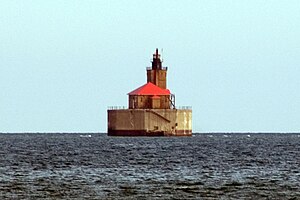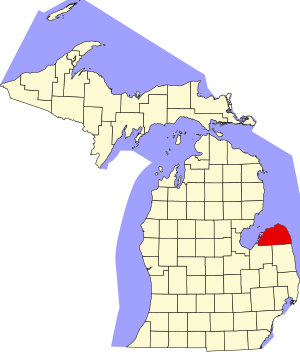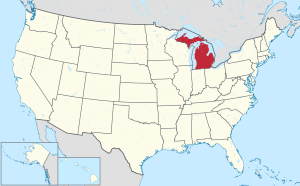Huron County, Michigan
Huron County | |
|---|---|
 | |
 Location within the U.S. state of Michigan | |
 Michigan's location within the U.S. | |
| Coordinates: 43°52′N 83°02′W / 43.87°N 83.03°W | |
| Country | |
| State | |
| Founded | April 1, 1840 (created) January 25, 1859 (organized)[1] |
| Named for | Lake Huron |
| Seat | Bad Axe |
| Largest city | Bad Axe |
| Area | |
• Total | 2,137 sq mi (5,530 km2) |
| • Land | 836 sq mi (2,170 km2) |
| • Water | 1,301 sq mi (3,370 km2) 61% |
| Population (2020) | |
• Total | 31,407 |
| • Density | 15/sq mi (6/km2) |
| Time zone | UTC−5 (Eastern) |
| • Summer (DST) | UTC−4 (EDT) |
| Congressional district | 9th |
| Website | co |
| U.S. Geological Survey Geographic Names Information System: Huron County, Michigan | |
Huron County (/ˈhjʊərɒn, -ən/ HURE-on, -ən) is a county in the U.S. state of Michigan. As of the 2020 Census, the population was 31,407.[2] The county seat is Bad Axe.[3] Huron County is at the northern tip of the Thumb, which is a sub region of Mid Michigan. It is a peninsula, bordered by Saginaw Bay to the west and Lake Huron to the north and east, and has over 90 miles (140 km) of shoreline, from White Rock on Lake Huron to Sebewaing on the Saginaw Bay. Huron County's most prominent industry is agriculture, as with most of the other Thumb counties. Huron County enjoys seasonal tourism from large cities such as Detroit, Flint, and Saginaw. Much of the tourism is in the Port Austin and Caseville area.
History
[edit]Huron County was originally attached to neighboring Sanilac and Tuscola counties. It was created by Michigan law on April 1, 1840,[4] and was fully organized by an Act of Legislature on January 25, 1859.[1] Sand Beach (now Harbor Beach) was the county seat until 1865, when the court house burned, destroying most of its records. The county seat was moved to Port Austin and remained there until 1873, when the county's Board of Supervisors designated Bad Axe as the county seat.[5]
The name Huron was derived from the word "hures" as used in the phrase "În elles hures" (what heads) as applied by an astonished French traveler to the Wyandotte (Huron) Indians on beholding their mode of dressing the hair. During 1649 and the Beaver Wars of the mid-17th century, the Iroquois from the areas of New York and Pennsylvania drove out the Wyandotte, in order to control the fur trade.[1]
In the 17th and early 18th century in this region, the Thumb of Michigan, the Wyandotte suffix "onti" or "ondi" was used in place names such as Skenchioetontius and E. Kandechiondius. "Onti" means to "jut out". The name Wyandotte, Huron descendants, was said to mean "dwellers of the peninsula". A headland or peninsula in Onondaga, an Iroquoian language, is "onoentoto".
In the early 18th century, the Thumb of Michigan was said to have the best beaver hunting in America. The Detroit region was called Tio-sahr-ondion, "where it is beaver dams athwart many". This was near Skenchioe [now Huron and Sanilac counties].
About 1700, French maps indicated the region of Saginaw and the Thumb of Michigan as "Chasse des caster des amis de François", "the beaver hunting grounds of the friends of Francis."
Geography
[edit]According to the U.S. Census Bureau, the county has a total area of 2,137 square miles (5,530 km2), of which 836 square miles (2,170 km2) is land and 1,301 square miles (3,370 km2) (61%) is water.[6]
Huron county is heavily agricultural. The county is generally flat, with some rolling hills.
Adjacent counties
[edit]By land
- Sanilac County (southeast)
- Tuscola County (southwest)
By water
- Arenac County (northwest)
- Iosco County (northwest)
Highways
[edit] M-19 - runs north and south through the southern half of the county
M-19 - runs north and south through the southern half of the county M-25 - runs along the outer edge of the county, along the shore of Lake Huron and Saginaw Bay
M-25 - runs along the outer edge of the county, along the shore of Lake Huron and Saginaw Bay M-53 - runs north and south through the central part of the county
M-53 - runs north and south through the central part of the county M-142 - runs east and west through the central part of the county
M-142 - runs east and west through the central part of the county
Demographics
[edit]| Census | Pop. | Note | %± |
|---|---|---|---|
| 1850 | 210 | — | |
| 1860 | 3,165 | 1,407.1% | |
| 1870 | 9,049 | 185.9% | |
| 1880 | 20,089 | 122.0% | |
| 1890 | 28,545 | 42.1% | |
| 1900 | 34,162 | 19.7% | |
| 1910 | 34,758 | 1.7% | |
| 1920 | 32,768 | −5.7% | |
| 1930 | 31,132 | −5.0% | |
| 1940 | 32,584 | 4.7% | |
| 1950 | 33,149 | 1.7% | |
| 1960 | 34,006 | 2.6% | |
| 1970 | 34,083 | 0.2% | |
| 1980 | 36,459 | 7.0% | |
| 1990 | 34,951 | −4.1% | |
| 2000 | 36,079 | 3.2% | |
| 2010 | 33,118 | −8.2% | |
| 2020 | 31,407 | −5.2% | |
| 2023 (est.) | 30,927 | [7] | −1.5% |
| US Decennial Census[8] 1790-1960[9] 1900-1990[10] 1990-2000[11] 2010-2018[2] | |||
The 2010 United States Census[12] indicates Huron County had a 2010 population of 33,118. This decrease of -2,961 people from the 2000 United States Census represents an 8.2% decrease. In 2010 there were 14,348 households and 9,328 families in the county. The population density was 39.6 per square mile (15.3/km2). There were 21,199 housing units at an average density of 25.4 per square mile (9.8/km2). 97.5% of the population were White, 0.4% Asian, 0.4% Black or African American, 0.3% Native American, 0.4% of some other race and 0.9% of two or more races. 2.0% were Hispanic or Latino (of any race). 41.1% were of German, 15.9% Polish, 6.8% Irish, 6.1% English and 6.0% American ancestry.[13]
There were 14,348 households, out of which 24.7% had children under the age of 18 living with them, 52.7% were husband and wife families, 8.1% had a female householder with no husband present, 35.0% were non-families, and 30.7% were made up of individuals. The average household size was 2.27 and the average family size was 2.81.
In the county, the population was spread out, with 20.7% under age of 18, 6.4% from 18 to 24, 20.4% from 25 to 44, 30.8% from 45 to 64, and 21.7% who were 65 years of age or older. The median age was 47 years. For every 100 females there were 98.5 males. For every 100 females age 18 and over, there were 97.3 males.
The 2010 American Community Survey 3-year estimate[12] indicates the median income for a household in the county was $38,789 and the median income for a family was $46,533. Males had a median income of $26,688 versus $15,198 for females. The per capita income for the county was $21,342. About 1.4% of families and 14.4% of the population were below the poverty line, including 19.7% of those under the age 18 and 10.4% of those age 65 or over.
Religion
[edit]- The United Methodist Church is strong in the Thumb region.
- The Roman Catholic Diocese of Saginaw is the controlling regional body for the Catholic Church.[14]
- All Episcopal parishes are members of the Episcopal Diocese of Eastern Michigan
- The Church of Jesus Christ of Latter-day Saints has one meetinghouse in Huron County.[15]
Government
[edit]The county government operates the jail, maintains rural roads, operates the major local courts, records deeds, mortgages, and vital records, administers public health regulations, and participates with the state in the provision of social services. The county board of commissioners controls the budget and has limited authority to make laws or ordinances. In Michigan, most local government functions — police and fire, building and zoning, tax assessment, street maintenance, etc. — are the responsibility of individual cities and townships.
Elected officials
[edit]- Prosecuting Attorney: Timothy J. Rutkowski
- Sheriff: Kelly J. Hanson
- County Clerk: Lori S. Neal
- County Treasurer: Deb McCollum
- Register of Deeds: Sarah Durr
- Circuit Court Judge: Hon. M. Gerald M. Prill
- Probate Court Judge: Hon. David L. Clabuesch
- District Court Judge: Hon. David B. Herrington
- Commissioner Dist 1: Sami Khoury (R)
- Commissioner Dist 2: Michael Meissner (R)
- Commissioner Dist 3: Todd Talaski (R)
- Commissioner Dist 4: Steve Vaughan (R)
- Commissioner Dist 5: John L. Bodis (R)
- Commissioner Dist 6: Joe Murphy (R)
- Commissioner Dist 7: Mary Ellen Babcock (R)
Politics
[edit]Huron County voters have generally supported Republican Party candidates. Since 1884, they have selected the Republican Party nominee in 81% of national elections (29 of 36). In 2016, Donald Trump carried the county by the largest margin in 32 years and won by an even larger margin in 2020.
| Year | Republican | Democratic | Third party(ies) | |||
|---|---|---|---|---|---|---|
| No. | % | No. | % | No. | % | |
| 2020 | 12,731 | 69.03% | 5,490 | 29.77% | 221 | 1.20% |
| 2016 | 10,692 | 67.06% | 4,579 | 28.72% | 673 | 4.22% |
| 2012 | 8,806 | 56.87% | 6,518 | 42.10% | 160 | 1.03% |
| 2008 | 8,434 | 49.22% | 8,367 | 48.83% | 334 | 1.95% |
| 2004 | 9,671 | 55.37% | 7,629 | 43.68% | 166 | 0.95% |
| 2000 | 8,911 | 55.37% | 6,899 | 42.86% | 285 | 1.77% |
| 1996 | 6,126 | 41.24% | 6,827 | 45.96% | 1,902 | 12.80% |
| 1992 | 6,491 | 39.03% | 6,023 | 36.21% | 4,118 | 24.76% |
| 1988 | 9,419 | 61.91% | 5,714 | 37.56% | 81 | 0.53% |
| 1984 | 11,073 | 73.37% | 3,966 | 26.28% | 52 | 0.34% |
| 1980 | 10,553 | 65.27% | 4,434 | 27.43% | 1,180 | 7.30% |
| 1976 | 9,297 | 61.26% | 5,721 | 37.70% | 158 | 1.04% |
| 1972 | 9,832 | 67.36% | 4,456 | 30.53% | 308 | 2.11% |
| 1968 | 8,743 | 64.51% | 3,607 | 26.62% | 1,202 | 8.87% |
| 1964 | 6,263 | 45.96% | 7,349 | 53.93% | 14 | 0.10% |
| 1960 | 9,592 | 62.34% | 5,775 | 37.53% | 19 | 0.12% |
| 1956 | 10,493 | 76.57% | 3,192 | 23.29% | 19 | 0.14% |
| 1952 | 10,639 | 81.28% | 2,421 | 18.50% | 29 | 0.22% |
| 1948 | 7,978 | 74.92% | 2,562 | 24.06% | 108 | 1.01% |
| 1944 | 9,538 | 80.16% | 2,301 | 19.34% | 59 | 0.50% |
| 1940 | 10,570 | 79.73% | 2,654 | 20.02% | 34 | 0.26% |
| 1936 | 5,240 | 46.76% | 3,949 | 35.24% | 2,018 | 18.01% |
| 1932 | 5,707 | 48.82% | 5,770 | 49.36% | 213 | 1.82% |
| 1928 | 7,046 | 64.79% | 3,797 | 34.91% | 32 | 0.29% |
| 1924 | 8,843 | 81.14% | 988 | 9.07% | 1,067 | 9.79% |
| 1920 | 8,354 | 82.57% | 1,581 | 15.63% | 182 | 1.80% |
| 1916 | 4,743 | 70.85% | 1,816 | 27.13% | 135 | 2.02% |
| 1912 | 1,813 | 28.61% | 1,236 | 19.50% | 3,288 | 51.89% |
| 1908 | 3,565 | 67.66% | 1,477 | 28.03% | 227 | 4.31% |
| 1904 | 4,191 | 71.09% | 1,486 | 25.21% | 218 | 3.70% |
| 1900 | 3,632 | 60.57% | 2,120 | 35.36% | 244 | 4.07% |
| 1896 | 3,396 | 53.64% | 2,808 | 44.35% | 127 | 2.01% |
| 1892 | 1,692 | 35.35% | 2,222 | 46.42% | 873 | 18.24% |
| 1888 | 1,608 | 34.51% | 1,988 | 42.67% | 1,063 | 22.82% |
| 1884 | 1,355 | 39.48% | 1,898 | 55.30% | 179 | 5.22% |
Parks and recreation
[edit]Tourism is important to Huron County with bay front and lakefront towns such as Sebewaing, Caseville, Port Austin, Port Hope, and Harbor Beach, attracting tourists from all over. Huron County borders the Saginaw Bay and Lake Huron. There are two state parks – Sleeper State Park and Port Crescent State Park – and three roadside parks – Jenks Park, Brown Park, and White Rock Park. Huron County also maintains eight county parks along the shoreline – Caseville Park, Lighthouse Park, Stafford Park, McGraw Park, Philp Park, Wagener Park, Oak Beach Park, and Sebewaing Park.
Communities
[edit]
Cities
[edit]- Bad Axe (county seat)
- Caseville
- Harbor Beach
Villages
[edit]Civil townships
[edit]- Bingham Township
- Bloomfield Township
- Brookfield Township
- Caseville Township
- Chandler Township
- Colfax Township
- Dwight Township
- Fairhaven Township
- Gore Township
- Grant Township
- Hume Township
- Huron Township
- Lake Township
- Lincoln Township
- McKinley Township
- Meade Township
- Oliver Township
- Paris Township
- Pointe Aux Barques Township
- Port Austin Township
- Rubicon Township
- Sand Beach Township
- Sebewaing Township
- Sheridan Township
- Sherman Township
- Sigel Township
- Verona Township
- Winsor Township
Census-designated place
[edit]Other unincorporated communities
[edit]See also
[edit]- List of Michigan State Historic Sites in Huron County, Michigan
- National Register of Historic Places listings in Huron County, Michigan
References
[edit]- ^ a b c "Bibliography on Huron County". Clarke Historical Library, Central Michigan University. Archived from the original on April 18, 2012. Retrieved January 19, 2013.
- ^ a b "State & County QuickFacts". US Census Bureau. Retrieved September 15, 2021.
- ^ "Find a County". National Association of Counties. Archived from the original on May 31, 2011. Retrieved June 7, 2011.
- ^ George Dawson (1840). Acts of the Legislature of the State of Michigan Passed at the Annual Session of 1840. Detroit. pp. 196–200.
- ^ "Huron County Earliest Settlers", Chapter 2 (9-31) Archived May 17, 2008, at the Wayback Machine, Deckerville Library
- ^ "2010 Census Gazetteer Files". US Census Bureau. August 22, 2012. Archived from the original on November 13, 2013. Retrieved September 25, 2014.
- ^ "Annual Estimates of the Resident Population for Counties: April 1, 2020 to July 1, 2023". United States Census Bureau. Retrieved April 4, 2024.
- ^ "US Decennial Census". US Census Bureau. Retrieved September 25, 2014.
- ^ "Historical Census Browser". University of Virginia Library. Retrieved September 25, 2014.
- ^ "Population of Counties by Decennial Census: 1900 to 1990". US Census Bureau. Retrieved September 25, 2014.
- ^ "Census 2000 PHC-T-4. Ranking Tables for Counties: 1990 and 2000" (PDF). US Census Bureau. Archived (PDF) from the original on March 27, 2010. Retrieved September 25, 2014.
- ^ a b "U.S. Census website". US Census Bureau. Retrieved March 11, 2012.
- ^ Data Access and Dissemination Systems (DADS). "U.S. Census website". census.gov.
- ^ "Diocese of Saginaw". saginaw.org.
- ^ "Worship With Us: Church Locator", ComeUntoChrist.org, 2020. Retrieved on March 24, 2020.
- ^ "Brief Overview of Huron County". www.co.huron.mi.us. Retrieved June 27, 2015.
- ^ "Huron County Official Election Results".
- ^ US Election Atlas
External links
[edit]- Huron County website
- Huron County economic development corporation
- "Bibliography on Huron County". Clarke Historical Library, Central Michigan University. Archived from the original on April 18, 2012. Retrieved January 19, 2013.
- Huron County Historical Society (Michigan), Huron County, Michigan. (2001, Arcadia Publishing).
- Huron County View (newspaper)
- Huron Daily Tribune (newspaper)

